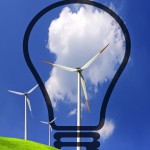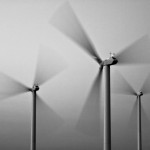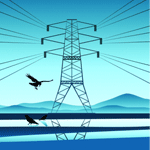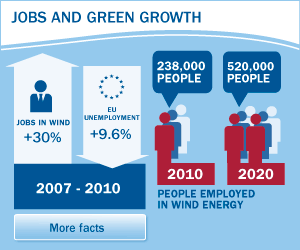 Overall, 70% of EU citizens think renewable energy should be prioritised as an energy option for the next 30 years, a Eurobarometer has found. The survey, “attitudes of Europeans towards air quality” published earlier this year found that the 70% compares to just 9% for unconventional fossil fuels like shale gas, and 8% for conventional fossil fuels.
Overall, 70% of EU citizens think renewable energy should be prioritised as an energy option for the next 30 years, a Eurobarometer has found. The survey, “attitudes of Europeans towards air quality” published earlier this year found that the 70% compares to just 9% for unconventional fossil fuels like shale gas, and 8% for conventional fossil fuels.
In all 27 EU Member States, “renewable energy sources in the most mentioned priority for energy options in the next 30 years,” the survey says.
The share of people favouring renewables over other sources rises to 82% in Portugal and 81% in Austria, Spain, Germany and Denmark. In only two EU countries did fewer than half of all respondents favour renewables – Bulgaria (45%) and Romania (49%), but in both countries renewables were still by far the most popular option.

Christian Kjaer
As EWEA CEO Christian Kjaer prepares to step down and hand-over to Thomas Becker on 1 April, he gives his thoughts on how the industry has changed over the past two years to Gail Rajgor, Managing Editor of Renewable Energy Focus…
Market over-capacity and the financial crisis
A dramatic shift has taken place for the fortunes of the global wind industry, when comparing it today with how it was just a few years ago, said Kjaer. If we take the last two years, we’ve gone from a seller’s market, if you look at wind turbines, to a buyer’s market, Kjaer told Rajgor.
It’s very clear that globally there is an immense amount of over-capacity. We invested in production capacity in anticipation that the market would continue to grow dramatically globally, but it hasn’t. That means we’ve had a very dramatic change in the whole supply/demand balance in the sector, he said, and the change has happened very quickly.
The result is that the cost of wind energy has come down, but at the same time the sector is facing challenges, aggravated by the financial crisis, which has meant banks are more reluctant to lend, he said.

Copyright Charles Delplanque
After a gloomy couple of years for the wind industry in France, a few glimmers of light have been spotted in recent weeks led by the adoption by the National Assembly of a bill proposed by the Socialist government to simplify measures that have been stymieing the development of the sector.
To boost the production of wind energy in France, help develop other renewable sources of energy and generally encourage the shift towards clean and efficient energy, the government is proposing to weight consumer energy bills according to household consumption from 2016. It has also put forward a raft of measures aimed at making it easier to set up wind farms.
The government proposal suggests a reward/penalty system for calculating consumer energy bills that will take into consideration the amount of energy used, the number of occupants in a household, geographical location, the type of heating system used and local climate conditions.
The law also includes plans to facilitate the construction of small wind farms with fewer than five turbines. Under existing laws, onshore farms must have a minimum of five turbines. This decision is critical if France is to meet its target of 25,000 megawatt installed capacity by 2020, says French renewable energy group SER. France’s total capacity currently stands at about 7,560 MW.
 Recent technological advances by leading engineering companies to improve the integration of renewable energy, especially wind energy, within Europe’s power grid by 2020, will bring a pan-European electricity grid closer to reality.
Recent technological advances by leading engineering companies to improve the integration of renewable energy, especially wind energy, within Europe’s power grid by 2020, will bring a pan-European electricity grid closer to reality.
Last year, the Swiss-based engineering company ABB announced the development of the world’s first circuit breaker for high voltage direct current (HVDC). “This solves a 100-year-old electrical engineering puzzle and paves the way for a more efficient and reliable electricity supply system,” says ABB. Most importantly, “it will enable the efficient integration and exchange of renewable energy”.
HVDC technology combines very fast mechanics with power electronics, and will be capable of ‘interrupting’ power flows equivalent to the output of a large power station within five milliseconds- that is 30 times faster than the blink of a human eye, says ABB. It is needed to facilitate the integration of offshore wind power and energy from other renewable sources and to interconnect different power networks in particular since it is efficient for the long-distance transportation of electricity.

European Commissioner for Energy Günther Oettinger
by Kara Perconti
The European Parliament yesterday gave its green light to the guidelines for the EU energy infrastructure package, which sets out corridors for Europe-wide energy infrastructure, seeks to speed-up permits and identifies priority projects, including an offshore electricity grid in the North Sea.
“This is really a breakthrough and will give a big push to much needed infrastructure: Rather than waiting up to 12 years or longer for a permit, developers of crucial cross-border infrastructure – such as pipelines or power grids – will have a decision in about four years,” said European Commissioner for Energy, Günther Oettinger. “This will save them time and money – and will help us creating a true European market where energy systems are physically connected with each other. Consumers and companies will profit because competition keeps costs down”.
The next step is for the European Council to formally approve the regulation.
 Overall, 70% of EU citizens think renewable energy should be prioritised as an energy option for the next 30 years, a Eurobarometer has found. The survey, “attitudes of Europeans towards air quality” published earlier this year found that the 70% compares to just 9% for unconventional fossil fuels like shale gas, and 8% for conventional fossil fuels.
Overall, 70% of EU citizens think renewable energy should be prioritised as an energy option for the next 30 years, a Eurobarometer has found. The survey, “attitudes of Europeans towards air quality” published earlier this year found that the 70% compares to just 9% for unconventional fossil fuels like shale gas, and 8% for conventional fossil fuels.






 Comments
Comments



